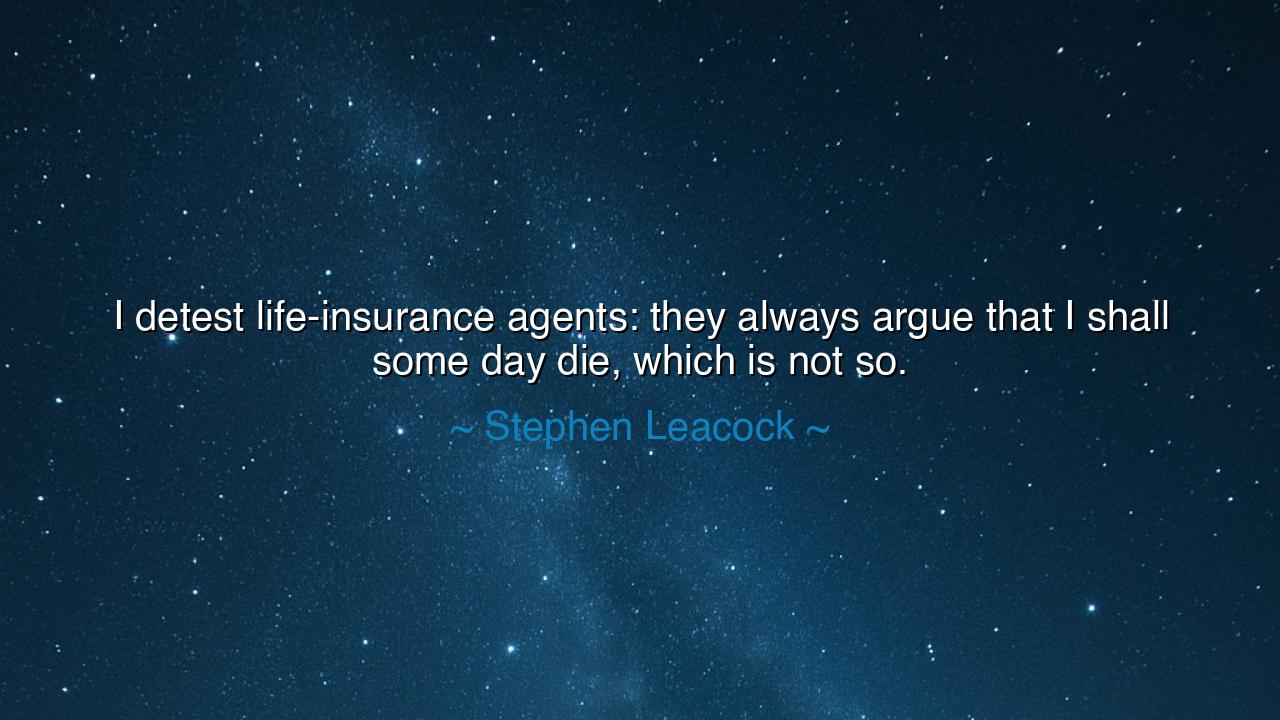
I detest life-insurance agents: they always argue that I shall
I detest life-insurance agents: they always argue that I shall some day die, which is not so.






The humorist and philosopher Stephen Leacock, with his gentle wit and sharp understanding of human nature, once wrote: “I detest life-insurance agents: they always argue that I shall some day die, which is not so.” Though cloaked in humor, this line is far more than a jest—it is a mirror held to the deepest denial of mankind. Beneath the laughter lies a profound truth: that men fear death not only because it ends life, but because it challenges their illusion of permanence. In Leacock’s satire, we hear the ancient voice of humanity’s struggle to accept mortality—the tender, trembling hope that somehow, we might be the one to escape the fate that claims all others.
When Leacock mocks the life-insurance agent, he does so not out of disdain for the profession, but out of discomfort with what it represents: the quiet reminder that death is certain. The agent is not selling death, but security against its consequences—and yet his very argument requires one to admit, however reluctantly, “I shall die.” Leacock’s refusal—“which is not so”—is a playful denial, but also a revealing one. It exposes the universal instinct to resist the inevitable, to cling to the illusion that death belongs to others, never to ourselves. Thus, through laughter, he reveals what all wise men know: that humor is the mask through which truth most safely speaks.
The origin of this quote lies in Leacock’s lifelong talent for blending comedy with philosophy. A Canadian economist, writer, and satirist of the early 20th century, he saw in ordinary life the eternal absurdities of human thought. His humor, like that of Mark Twain or Oscar Wilde, was not cruelty but compassion—the laughter of one who sees folly and forgives it. In mocking mankind’s denial of death, he also forgives it. For who among us, truly, wishes to spend life haunted by the shadow of its end? His quip becomes, therefore, both a jest and a mercy, allowing us to laugh at what we fear, and in laughing, to bear it more lightly.
Through the ages, the wisest have spoken of this denial in different tongues. The Egyptians, though they built tombs of eternity, filled them with food and gold, as though life might continue beyond the veil. The Romans, while feasting, would whisper memento mori—“remember, you will die”—yet the very need for such a reminder proves how easily the mind forgets. Even in modern times, we build industries, empires, and dreams upon the assumption of endless tomorrows. We prepare for every misfortune but the one that is certain. Leacock, with a laugh, reminds us that the human soul resists its own ending, even as the world around it testifies to mortality in every fading leaf and setting sun.
Yet, beneath his humor lies also a gentle wisdom—that perhaps this denial of death is not entirely foolish. For what would life become if one were forever conscious of its brevity? Would we still plant trees, build homes, write books, and love deeply if every breath felt like a countdown? The illusion of permanence, though false, is also fruitful. It gives the heart courage to act, to create, to hope. As the ancients knew, man must live as though immortal in order to truly live at all. Leacock’s jest thus becomes a paradox of life itself: to live well, we must forget that we will die, even as we prepare for the day it comes.
A similar spirit can be found in the tale of Emperor Hadrian, who once wrote to his own departing soul: “Little soul, wandering and pale, you will go to places colorless and bare.” Yet Hadrian lived magnificently until his final hour, building monuments and writing verse, as though art could defy oblivion. Like Leacock, he seemed to say: “Yes, death is certain—but until it comes, I live as though it is not.” And indeed, that is the secret harmony of wisdom and denial: to honor death by living as if one were eternal, to accept fate not through surrender, but through creation.
So, my child, learn from Stephen Leacock’s humor what philosophers have long taught in solemn tones: that the denial of death, though irrational, is part of the divine comedy of existence. Laugh gently at your own resistance to the inevitable, but let it also remind you to live fully. Do not waste your days fearing what cannot be avoided. Instead, fill your time with action, love, and joy, for those are the true answers to mortality. And when the “life-insurance agent” of reality comes knocking—whether in the form of age, loss, or reflection—greet him not with dread, but with a smile, saying, “Not yet, my friend. Today, I live.”
For though death awaits all, the spirit that laughs in the face of its certainty achieves a kind of immortality—not in the flesh, but in the freedom to live without fear. That, perhaps, is the secret Leacock hides within his jest: that through humor, we make peace with the inevitable, and through laughter, we taste eternity.






AAdministratorAdministrator
Welcome, honored guests. Please leave a comment, we will respond soon